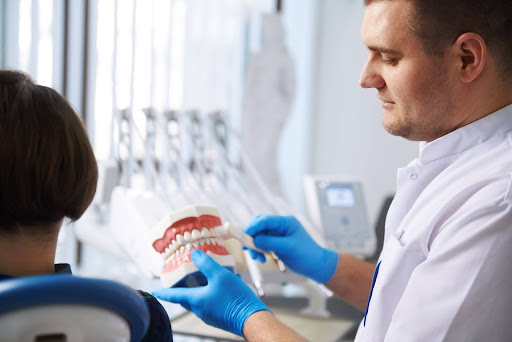Is At-Home Oral Hygiene Enough to Prevent Gum Disease?

So you brush your teeth twice daily, clean between the teeth diligently with an interdental brush or dental floss, and avoid sugary sweets and snacks. That’s great for keeping your teeth and gums healthy and preventing oral problems! But is it enough? Does it ensure you’re safe from gum disease or tooth decay? While preventive care forms the foundation of a healthy mouth, there’s a lot more involved in maintaining the optimal balance of oral health and protecting yourself from oral diseases and problems. In this article, we will delve deeper into gum disease prevention and the care required to protect yourself from oral diseases and retain a healthy smile for life.
What is Gum Disease?
Gum, or periodontal disease, is a common and preventable condition that affects the tissues surrounding and supporting the teeth. It is primarily caused by bacteria in plaque, a sticky film that forms on the teeth and gums. Plaque is a biofilm of bacteria, food particles, and saliva that constantly forms on the teeth and along the gumline. It develops naturally and is a normal part of the oral environment, but when allowed to accumulate, it can lead to various dental problems, including gum disease and tooth decay.
Plaque can be adequately removed with daily brushing and interdental cleaning. However, when it accumulates, it hardens into tartar or dental calculus. This penetrates the gumline, causing inflammation because of the bacteria and leading to gum disease. Tartar can only be removed with a professional dental cleaning. No amount of brushing can remove it once it has hardened.
There are two stages of gum disease:
Gingivitis
Gingivitis is the earliest stage of gum disease and is characterised by inflammation of the gums. Symptoms may include red, swollen, or tender gums, bleeding gums when brushing or flossing, and persistent bad breath. Gingivitis is reversible with proper oral hygiene measures, including regular brushing, flossing, and professional dental cleanings. Removing plaque and tartar buildup can help alleviate symptoms and prevent progression to more severe forms of gum disease.
Periodontitis
Gingivitis, if left untreated, can progress into periodontitis, the advanced stage of gum disease, damaging the supporting structures of the teeth, including the periodontal ligament and bone that keeps your teeth in your mouth. This can cause the formation of pockets between the gums and teeth, which can become infected and lead to further inflammation, tissue destruction, and bone loss. Its symptoms include receding gums, tooth sensitivity, loose or shifting teeth, pus between the teeth and gums, and changes in the fit of dentures or dental appliances. Periodontitis can cause irreversible damage to the gums and supporting bone and may eventually lead to tooth loss if not properly managed. Treatments may involve deep cleaning procedures such as scaling and root planing, antibiotic therapy and, in some cases, surgical intervention to repair damaged tissues and regenerate lost bone.
Causes of Gum Disease
Gum disease is mainly caused by the accumulation of bacterial plaque along the gumline and on the surfaces of the teeth. However, several factors can contribute to the development and progression of gum disease:
- Poor at-home oral hygiene
- Smoking or tobacco use
- Hormonal changes
- Ageing and genetics
- Chronic stress
- Excessive teeth clenching and grinding habits
- Poor nutrition or a diet high in sugary foods
- Weakened immune system because of certain medical diseases
Gum disease can impact more than your oral health. When the bacteria from your mouth enters the bloodstream, it can travel to other body parts. This can lead to systemic inflammation and the development or worsening of health conditions such as diabetes, stroke, high blood pressure, rheumatoid arthritis, Alzheimer’s disease, kidney disease, and certain cancers. The body’s immune response to chronic gum infection can lead to immune system dysfunction and impair the ability to fight off infections.
A weakened immune system may increase susceptibility to other infections and illnesses, making it harder for the body to recover from systemic health problems. This can also lead to complications during pregnancy, as expectant mothers are already at an elevated risk of infections because of the body entering an immunocompromised state to accommodate the fetus. Additionally, people with diabetes or other systemic diseases have a higher risk of getting gum disease and vice versa. This further emphasises the importance of protecting yourself from a chronic oral condition, which is irreversible when it progresses into periodontitis.
Why is At-Home Oral Hygiene Not Always Enough to Prevent Gum Disease?
While brushing and interdental cleaning are essential to maintaining oral health, they may not always be enough to keep all areas of your mouth free from bacteria. Here are some reasons why:
Inadequate Plaque Removal
Despite regular brushing and flossing, removing all plaque and bacteria from the teeth and gums can be challenging, especially in hard-to-reach areas, such as between teeth and below the gumline. Plaque that remains on the teeth can harden into tartar, which cannot be removed by brushing and flossing alone and requires professional dental cleaning.
Poor Technique
Improper brushing and flossing techniques can leave behind plaque and food debris, increasing the risk of gum inflammation and disease. Many people may not brush or floss effectively, leading to hidden pockets of bacteria beneath the gumline and in inaccessible areas such as the back teeth.
Risk factors
Ageing, genetics, hormonal changes and autoimmune diseases increase the risk of developing gum disease. At-home care may not always be enough for such people due to their immune response, gum tissue structure, or susceptibility to bacterial infections. In such cases, additional preventive measures and professional dental care may be necessary to manage gum health effectively.
Missing Dental Checkups
Regular dental check-ups and professional cleanings are an integral part of preventive care. They allow dentists to detect potential issues such as tooth decay, impacted wisdom teeth and conditions like gum disease and oral cancer early. This allows for timely intervention and prompt treatment, minimising the spread risk and increasing the chances of cure and recovery.
Importance of Professional Dental Care in Gum Disease Prevention
Most people only visit the dentist once they have a toothache or notice something that needs to be corrected in their mouth. It’s important to understand that your dentist has the experience and training to recognise symptoms that may not be visible to the naked eye. Prompt dental intervention is essential when it comes to gum disease.
Here’s how professional dental care can help prevent gum disease:
Comprehensive Examination
Regular dental check-ups are an integral part of preventive care. They involve thoroughly examining your oral health, including the gums, teeth, and supporting structures, allowing dentists to detect potential issues such as tooth decay, impacted wisdom teeth and conditions like gum disease and oral cancer early. Timely intervention and prompt treatment minimise the spread risk and increase the chances of cure and recovery.
Dental Cleaning
Professional dental cleanings remove plaque and tartar buildup from the teeth and along the gumline. Even with diligent brushing and interdental cleaning at home, tartar cannot be removed by regular brushing alone. Professional cleanings help prevent the accumulation of plaque and tartar, reducing the risk of gum inflammation and disease.
Personalised Oral Hygiene Instructions
At Whitehorse Dental, we promote preventive care, providing guidance and oral care instructions tailored to your specific needs. We have different types of patients, all at different risk levels. Those with a higher risk may need dental checkups every three months, while others may need to come in every six months to a year. Our goal is always to reduce the risk level, helping patients improve their oral health and reducing the risk of oral problems for healthier and stronger teeth and gums.
Personalised oral hygiene plans and instructions allow us to recommend appropriate oral hygiene products and correct brushing techniques and provide invaluable advice to maintain your oral and overall health. We can detect even minor changes in the mouth during regular dental checkups and identify the reason behind them to prevent further damage or rectify any habit, be it a change in product or diet or any other factor harming your oral health.
Periodontal Therapy
Dentists can provide appropriate periodontal therapy to manage the condition effectively if gum disease is detected during a dental examination. This may include deep cleaning procedures such as scaling and root planing to remove plaque and tartar from below the gumline and other interventions to reduce inflammation and promote gum tissue healing.
Monitoring and Maintenance
Regular dental visits are essential for ongoing monitoring and maintenance for patients with a history of gum disease or other risk factors. Dentists can track changes in gum health over time, provide preventive treatments as needed, and help you develop a long-term plan to manage gum disease and maintain optimal oral health.
Healthy Gums Begin with Proactive Care
Gums hold your teeth together, providing a stable foundation for your teeth and other supporting structures. Preventive and proactive dental care is a partnership between you and your dentist. Don’t overlook the importance of dental checkups, cleanings and oral screenings. They can save you from diseases, pain, and extensive dental procedures, allowing you to retain your natural teeth and healthy gums for a vibrant smile. Take the first step towards a lifetime of optimal oral health by booking your dental checkup at Whitehorse Dental today.



